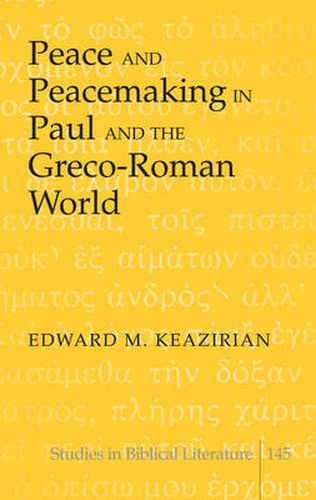Readings Newsletter
Become a Readings Member to make your shopping experience even easier.
Sign in or sign up for free!
You’re not far away from qualifying for FREE standard shipping within Australia
You’ve qualified for FREE standard shipping within Australia
The cart is loading…






This title is printed to order. This book may have been self-published. If so, we cannot guarantee the quality of the content. In the main most books will have gone through the editing process however some may not. We therefore suggest that you be aware of this before ordering this book. If in doubt check either the author or publisher’s details as we are unable to accept any returns unless they are faulty. Please contact us if you have any questions.
Peace and Peacemaking in Paul and the Greco-Roman World compares the Apostle Paul’s understanding of peace with various conceptions of peace in the Greco-Roman thought world of the first century. In contrast to similar studies that focus on the question of pacifism in the ancient world, the author seeks to clarify how the Greeks defined peace and then to show how their conception of war and peace established the ethos that ultimately defined them as a people.
From their earliest days, the city-states that eventually became Greece were constantly ravaged by war. Their myth, legend, religion, education, philosophy, and science created and perpetuated the idea that conflict was essential for existence. This idea passed to Rome as well so that by the first century, the Greco-Roman world consistently viewed peace as brief periods of tranquility in an existence where war and conflict were the norm.
Paul, however, insists that peace must be the norm within the churches. Peace originates in God and is graciously given to those who are justified and reconciled to God through Jesus Christ. God removes the enmity caused by sin and provides the indwelling Spirit to empower believers to think and behave in ways that promote and maintain peace.
Three social dynamics (shame-honor, patron-client, and friendship-enmity) are at work in Paul’s approach to conflict resolution and peacemaking within the churches. Rather than giving specific procedures for resolving conflict, Paul reinforces the believers’ new identity in Christ and the implications of God’s grace, love, and peace for their thoughts, words, and behavior toward one another. Paul uses these three social dynamics to encourage believers in the right direction, but their ultimate motivation and empowerment must arise from their common relationship with God in Jesus Christ by the power of the Holy Spirit.
$9.00 standard shipping within Australia
FREE standard shipping within Australia for orders over $100.00
Express & International shipping calculated at checkout
This title is printed to order. This book may have been self-published. If so, we cannot guarantee the quality of the content. In the main most books will have gone through the editing process however some may not. We therefore suggest that you be aware of this before ordering this book. If in doubt check either the author or publisher’s details as we are unable to accept any returns unless they are faulty. Please contact us if you have any questions.
Peace and Peacemaking in Paul and the Greco-Roman World compares the Apostle Paul’s understanding of peace with various conceptions of peace in the Greco-Roman thought world of the first century. In contrast to similar studies that focus on the question of pacifism in the ancient world, the author seeks to clarify how the Greeks defined peace and then to show how their conception of war and peace established the ethos that ultimately defined them as a people.
From their earliest days, the city-states that eventually became Greece were constantly ravaged by war. Their myth, legend, religion, education, philosophy, and science created and perpetuated the idea that conflict was essential for existence. This idea passed to Rome as well so that by the first century, the Greco-Roman world consistently viewed peace as brief periods of tranquility in an existence where war and conflict were the norm.
Paul, however, insists that peace must be the norm within the churches. Peace originates in God and is graciously given to those who are justified and reconciled to God through Jesus Christ. God removes the enmity caused by sin and provides the indwelling Spirit to empower believers to think and behave in ways that promote and maintain peace.
Three social dynamics (shame-honor, patron-client, and friendship-enmity) are at work in Paul’s approach to conflict resolution and peacemaking within the churches. Rather than giving specific procedures for resolving conflict, Paul reinforces the believers’ new identity in Christ and the implications of God’s grace, love, and peace for their thoughts, words, and behavior toward one another. Paul uses these three social dynamics to encourage believers in the right direction, but their ultimate motivation and empowerment must arise from their common relationship with God in Jesus Christ by the power of the Holy Spirit.